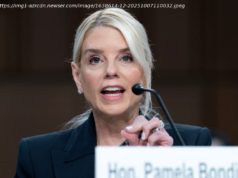After the weekend’s election in Russia and the expected coronation of Vladimir Putin as president yet again, some 20% of the world’s population and 17% of its entire land mass will could be ruled by two individuals serving, unchallenged, for life.
What Putin looks to have won in this vote, against a hand-picked selection of seven opponents he was guaranteed to overwhelm at the polls, is another six-year term — after which, should he desire, another will no doubt be enabled by a simple vote of the Duma, which is utterly under his control.
« If you go to a restaurant and they say, ‘We have no menu, we have only pizza,’ then you take pizza, » shrugs Mikhail Zygar, a Moscow-based journalist and author of « All the Kremlin’s Men: Inside the Court of Vladimir Putin. »
And indeed, Putin is already laying the ground for a perpetual rule. « Even now, he is replacing his old guard with new people, younger technocrats in their 40s, children of his old friends, so he is surrounded by ‘nephews,' » Zygar says. « He is scared he could be murdered like Gadhafi. This is why he prefers to do anything to preserve power, so there are no limits, but to remain in power. »
Not surprisingly, Putin has managed to muster an overwhelming majority in each of his candidacies.
Faced with Putin’s single-minded fixation on the apparently existential need to preserve power, the United States — and the rest of the world — will have to learn to deal with such an autocratic imperative.
Understanding this motivation and the reality that derives from it should help leaders develop a strategy of dealing with Putin and his entourage.
What is most useful is to go back to George Kennan for a lesson. Kennan was a leading diplomat and historian who served in the US embassy in Moscow during the 1940s and 1950s, and briefly as ambassador to the Soviet Union under President Truman.
During his tenure he developed the concept of « containment » which he set forth in the landmark « long telegram. »
« The main element of any United States policy toward the Soviet Union must be a long-term, patient but firm and vigilant containment of Russian expansive tendencies, » Kennan wrote to the State Department, attributing these motivations to the « traditional and instinctive Russian sense of insecurity. » In this respect, as in many others, Putin is a perfect reflection of the psyche of the vast majority of those he rules.
This means, today is little different from what Kennan was suggesting more than a half century ago — the need to be tough on Russia. President Trump needs to learn the real pressure points that work, be consistent and be prepared to play the long game. Autocrats of this sort understand no other language and recognize that sanctions take a very long time to work their intended effects.
In every respect Putin needs to be stood up to — in economic, military and diplomatic terms. So far, he has come to feel himself all but untouchable, but his paranoia remains — and his goals that only feed that paranoia.
Putin feels a strong need to divide NATO. And he has worked determinedly along its fringes — seeking to pull Turkey on its eastern flank away from the alliance, challenging the Baltic states on the northern periphery with deployment of advanced, nuclear-capable weapons.
The attempted assassination of Sergei Skripal and his daughter in Britain plays well into this scenario both abroad and at home. Russian state television has been playing this very simply — as a justified attack against a traitor to the state.
And the expulsion of 23 Russian diplomats from London as a reprisal only allows Russia to rebuild its FSB station with new operatives who are little known to the British secret services, while at the same time allowing the Kremlin to expel a host of British agents who are well-plugged into the Russian system.
So far, no country has been prepared to impose on Russia the kinds of tough sanctions that appear to have worked effectively with North Korea. Indeed, only one sanction is likely to have an existential impact on today’s Russia — targeting its export of oil and gas. For a nation that Senator John McCain quite rightly called « a gas station masquerading as a country, » this would the ultimate challenge.
The only question is whether such a move would be truly effective against a leader whose ultimate fear is being murdered in a drainage ditch by opponents (which is how former Libyan dictator Moammar Gadhafi met his end).
Nevertheless, the clear intention of the West, but particularly the United States, which must take the lead, to stand up to Putin at his most vulnerable points will cause him if nothing else to pause for reflection — not a bad position to place an autocrat of any stripe.






